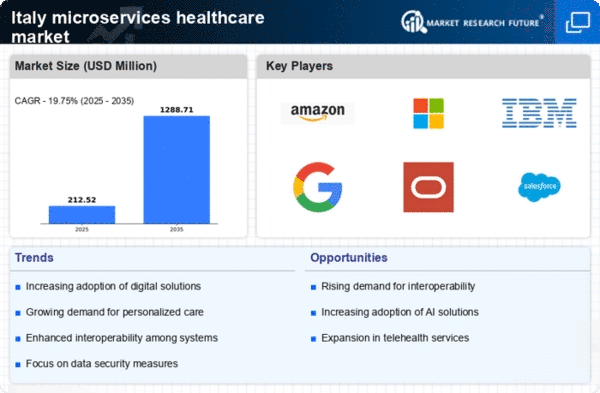Rising Demand for Agile Solutions
The microservices healthcare market in Italy is experiencing a notable surge in demand for agile solutions. Healthcare providers are increasingly seeking to enhance their operational efficiency and responsiveness to patient needs. This shift is driven by the necessity for rapid adaptation to changing healthcare landscapes and patient expectations. As a result, organizations are investing in microservices architectures that allow for modular development and deployment of applications. According to recent data, the adoption of microservices in healthcare is projected to grow at a CAGR of approximately 20% over the next five years. This trend indicates a strong inclination towards flexible and scalable solutions that can be tailored to specific healthcare requirements, thereby fostering innovation and improving patient outcomes.
Shift Towards Cloud-Based Solutions
The microservices healthcare market is witnessing a significant shift towards cloud-based solutions. This transition is largely driven by the need for scalable and cost-effective infrastructure that can support the growing volume of healthcare data. Cloud computing offers healthcare providers in Italy the ability to store, manage, and analyze vast amounts of data securely and efficiently. Furthermore, cloud-based microservices enable organizations to deploy applications rapidly, ensuring that they can respond to patient needs and regulatory changes promptly. Recent statistics suggest that the cloud healthcare market in Italy is expected to reach €2 billion by 2026, reflecting a growing preference for cloud solutions among healthcare providers. This trend not only enhances operational agility but also fosters collaboration among healthcare stakeholders.
Growing Focus on Telehealth Services
the microservices healthcare market is influenced by the growing focus on telehealth services. As healthcare providers in Italy seek to expand their reach and improve access to care, telehealth solutions are becoming integral to their service offerings. Microservices architecture facilitates the development of flexible telehealth applications that can be easily integrated with existing systems. This adaptability allows for the rapid deployment of telehealth services, catering to the diverse needs of patients. Recent data indicates that the telehealth market in Italy is expected to exceed €1 billion by 2025, driven by rising patient demand for remote consultations and monitoring. This trend not only enhances patient convenience but also optimizes resource allocation within healthcare systems.
Integration of Advanced Technologies
The integration of advanced technologies is a pivotal driver in the microservices healthcare market. Technologies such as artificial intelligence (AI), machine learning (ML), and big data analytics are being increasingly incorporated into healthcare systems. This integration facilitates enhanced data management, predictive analytics, and personalized patient care. In Italy, healthcare organizations are leveraging these technologies to optimize their services and improve decision-making processes. The microservices architecture supports this integration by allowing different technologies to operate independently while communicating seamlessly. As a result, the market is witnessing a transformation that not only enhances operational efficiency but also improves patient engagement and satisfaction. The potential for AI-driven solutions in healthcare is expected to reach €6 billion by 2027, indicating a robust growth trajectory.
Emphasis on Data Security and Compliance
Data security and compliance are critical drivers in the microservices healthcare market. With the increasing digitization of healthcare services, safeguarding patient data has become paramount. Italian healthcare organizations are prioritizing the implementation of robust security measures to protect sensitive information from breaches and cyber threats. The microservices architecture inherently supports enhanced security protocols, allowing for isolated services that can be monitored and secured independently. Additionally, compliance with regulations such as the General Data Protection Regulation (GDPR) is essential for maintaining patient trust and avoiding hefty fines. As a result, investments in security solutions are expected to rise, with the market for healthcare cybersecurity projected to grow by 15% annually. This focus on security not only protects patient data but also enhances the overall integrity of healthcare systems.
















